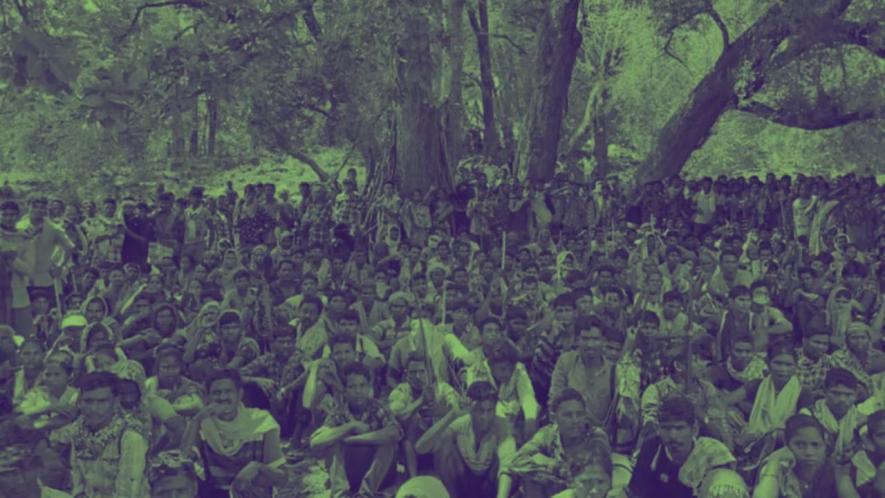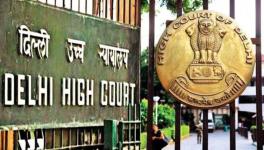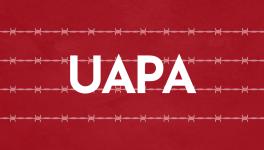Chhattisgarh: Land, Protests and 'Unlawful' Activities

On November 8, 2024, the Chhattisgarh government issued a gazette notification declaring the Moolvasi Bachao Manch (MBM) as an ‘unlawful organisation’ under its Special Public Security Act (CSPSA).
Like the Unlawful Activities (Prevention) Act (UAPA), 1967, the CSPSA empowers the government to proscribe organisations which, in its opinion, are engaged in unlawful activities.
The notification cites two reasons for this action: first, that the organisation opposes development works of the Union and state government in “Maoist-affected areas”; and second, that it mobilises the public against the setting up of security camps on their lands.
This unilateral ban comes into effect immediately, for one year, without prior confirmation by any judicial authority, and without affording a prior opportunity to the MBM to be heard against the ban.
This organisational ban demonstrates two deleterious subversions of constitutional law and criminal process. The first conflates democratic protest and assembly with ‘unlawful activities’, leading to their criminalisation under security laws such as the UAPA and Public Security Acts in different states. The first two parts of this article address, specifically, the grounds for the ban on the MBM against the scope of ‘unlawful activities’ under these laws.
This unilateral ban comes into effect immediately, for one year, without prior confirmation by any judicial authority, and without affording a prior opportunity to the MBM to be heard against the ban.
The second subversion enables the State to impose punitive penalties on association through proceedings outside the criminal justice system and without its accompanying fair trial guarantees. This is addressed in the third part.
Adivasis and Scheduled Tribes in the Fifth Schedule areas enjoy constitutional and statutory rights of consent and consultation on matters affecting their land and forest rights. These have been overridden through recent legislative amendments to land and forest laws, and in Chhattisgarh, increasingly, through executive writ relating to policing and securitisation which presently dwell in a legal void.
Protest and public mobilisations act as an invitation to the State to uphold democratic engagement with citizens and its own obligations under domestic and international law.
In this context, the ban on the MBM under the CSPSA demonstrates a troublesome evacuation of democratic norms and governance in the state, making the case not only for the recall of the ban but a holistic declaration of the CSPSA as unconstitutional.
Protest as democratic engagement
Chhattisgarh enacted the CSPSA in 2005 for the “effective prevention of certain unlawful activities of individuals and organisations”, as per its Preamble. An unlawful activity is defined in Section 2(e) on broadly three registers, namely, threats to public order, disobedience of legal institutions, and incitement to violence. An unlawful organisation is defined in Section 2(f) as one that, directly or indirectly, indulges in or declares as its object, an unlawful activity.
Pertinently, the notification of November 8, 2024, does not allege that MBM engaged in any acts of or incitement to violence. It bears asking, then, how opposition to the development works of the Union and state governments constitutes an unlawful activity. Is this opposition, per se, a public order disturbance? Or is it, per se, a disobedience of legal institutions?
Ex-officials of the MBM, in their representation to the home department, Chhattisgarh government on November 22, 2024, assert that they have in fact been asking the government to implement development projects that secure people's rights to education, health and their customary lands and forests.
Protest and public mobilisations act as an invitation to the State to uphold democratic engagement with citizens and its own obligations under domestic and international law.
Their opposition lies to the expenditure of public funds on the construction of roads and other industrial infrastructure. Such infrastructure facilitates not public transportation, but resource extraction, environmental destruction and mass displacement of Scheduled Tribes from their Fifth Schedule lands.
Their opposition is also to the persistent violation of the rights of gram sabhas to consent and consultation on matters affecting their forest rights and development. These rights are firmly recognised under the Fifth Schedule of the India Constitution; the Panchayats (Extension to Scheduled Areas) Act, 1996 (PESA); the Scheduled Tribes and Other Traditional Forest Dwellers (Recognition of Rights) Act (FRA); 2006, the Right to Fair Compensation and Transparency in Land Acquisition; Rehabilitation and Resettlement Act, 2013 (LARR), and the Niyamgiri judgment of the Supreme Court in 2013.
Far from disobeying the authority of law and legal institutions, MBM’s protest and assembly instead represent a call for the state government to uphold the law encoded in the Constitution and various Union and state legislations. Protest here is an invitation for democratic engagement on developmental priorities and resistance to the coercive imposition of policies determined ‘from above’.
What is troublesome is not simply that the state government is violating the rights of gram sabhas to consent, consultation and sustainable development. Union and state governments since Independence have transferred the debilitating costs of urban and industrial development to Adivasis.
This is a fact that governments themselves have always admitted to as being the root cause for conflict and insurgency in the so-called ‘Maoist-affected areas’. This is not to uncritically accept the violation of rights but to recognise that these historical injustices led to democratic mobilisations over time, culminating in the enactment of the PESA, the FRA and amendments to the LARR.
What is a greater cause for concern is the conflation of democratic mobilisation with ‘unlawful activities’ under anti-terror laws, and a militarised imposition of extractive development projects in Chhattisgarh.
Historically, the Indian State has criminalised democratic assembly and association under the general criminal law encoded in the Indian Penal Code (IPC) through its provisions relating to conspiracy, unlawful assembly, etc. Now, we are witnessing a drastic turn to the stringent counter-terror regime for the State to secure the same end.
Their opposition lies to the expenditure of public funds on the construction of roads and other industrial infrastructure.
Democratic mobilisations for citizenship rights in 2019–20 were criminalised as unlawful activities under the UAPA, for which Umar Khalid, Sharjeel Imam and several others continue to be incarcerated.
Similar first information reports (FIRs) under the UAPA were filed against farmers’ protests in January 2021 after the Republic Day rallies, although no one was arrested. The Union home minister denied doing so in the Parliament in August 2021.
The action against the MBM under the CSPSA is of an even higher order since it entails an organisational ban and not simply prosecutions against individuals for engaging in alleged unlawful activities.
A tale of public insecurity
The more stringent action against the MBM is explicable in the context of accelerating militarisation and securitisation of Fifth Schedule lands in Chhattisgarh. This brings us to the second ground for the ban cited in the November 8, 2024 notification, that the MBM mobilises the public against the setting up of security camps.
According to the Union home minister, more than 250 security camps have been set up in Bastar since 2019, with the inspector general, Bastar division declaring in February 2024 that another fifty will be set up. By certain tallies, there is presently one security official for every nine civilians in the region.
There has been scattered resistance to security camps since before mobilisations started picking up steam in 2021, when the police opened fire at protestors in Silger, killing three Adivasi men and one woman who later succumbed to her injuries.
Established ostensibly to counter Naxalism, people assert that these camps have instead generated tremendous public insecurity. An independent fact-finding report released in 2024 recounts a direct correlation between the proliferation of camps, and an increase in drone attacks, grenade firings and extra-judicial killings.
There were 141 ‘encounters’ in the first half of 2024 itself, declared in mainstream media as successful anti-Maoist operations. No FIRs or inquiry commissions have been set up in their aftermath to determine the accuracy of these claims.
MBM’s mobilisations insist on legal compliance in the establishment of these security camps. Under the Police Act of 1861, a law that has not been ‘decolonised’ along with other criminal laws, the inspector general of police has absolute discretion to decide on matters relating to the deployment of police forces.
Union and state governments since Independence have transferred the debilitating costs of urban and industrial development to Adivasis.
Unlike the criminal legal system, which regulates investigations and prosecution of crime, this form of police action is not subject to prior or post facto review by judicial authorities such as magistrates or sessions judges.
However, since these camps are set up on customary land and forests of Adivasis, the Fifth Schedule, PESA and FRA warrant prior consent or consultations with the gram sabha. With recent amendments to the Forest Conservation Act and other environmental and forest legislations, the Union government has instituted a series of exemptions from forest and environmental clearance for such security-related infrastructure, particularly for areas declared as affected by Left-wing extremism.
As a result, there is a complete absence of statutory, judicial or democratic oversight on the setting up of security camps in these areas, under all legal regimes, whether they relate to the administration of criminal justice, land and forests or environment.
This is in direct contravention of not only the constitutional order but also India’s international commitments under the United Nations Declaration on the Rights of Indigenous Peoples (UNDRIP). Article 30 of the UNDRIP asks for a demilitarisation of indigenous lands, and prior consultations with representative institutions of indigenous peoples for the use of their lands for security-related activities.
A landscape of unlawful laws
The tale of unilateral and unlawful police action is not limited to the setting up of security camps but is demonstrated in the organisational ban under the CSPSA itself. The Chhattisgarh government issued the letter banning the MBM on October 30, 2024, at least nine days before it was formally notified in the official gazette on November 8, 2024, and nineteen days before the MBM itself received notice of it on November 18, 2024, through informal Whatsapp channels.
Before bringing the ban into effect, the government did not offer justifications to any independent authority or to the affected persons themselves. No judge reviewed the basis of the ban or saw the materials on which it was based.
The action against the MBM under the CSPSA is of an even higher order since it entails an organisational ban and not simply prosecutions against individuals for engaging in alleged unlawful activities.
No representative of the affected organisation was put on notice, asked to defend themselves, or had the opportunity to be heard against the ban. Nevertheless, the MBM must forthwith cease all its activities, and all those associated with the organisation, either as members or not, become immediately susceptible to arrest and criminal prosecution under Section 8 of the CSPSA.
The law itself empowers the state government to take such unilateral and arbitrary action. Under Section 3(1), the government need only form an ‘opinion’ that an organisation is unlawful, and declare it as such simply through a gazette notification.
Section 3(2) requires that the notification specify the reasons for the ban, but not the materials on which it is based. The reasons, too, may be withheld in the public interest, with the power to define public interest also residing in the government.
Section 3(3) does require the government to serve individual notice of the ban on the office-bearers of the affected organisation, or at least to publish it in any one local newspaper. It is not clear whether this requirement was satisfied in this case or not, although, on the face of it, it appears to have not been fulfilled.
In this respect, the CSPSA abandons even a façade of due process, which the UAPA at least pretends to uphold in its banning provisions in Chapter II. Under Section 3 of the UAPA, while the procedure for notifying a ban through the official gazette is the same, it comes into effect only after a single-member tribunal, comprising a sitting judge of the high court, confirms it.
At this tribunal, the affected organisation nominally has an opportunity to be heard. It is a different matter that any representative stepping forth to represent themselves implicitly makes an admission of their association with the proscribed organisation and is liable to be arrested in case the ban is confirmed.
It is also a different matter that under the UAPA, tribunals effectively act as rubber-stamps on the decision of the government, as has been the experience with the consecutive bans on the Students Islamic Movement of India (SIMI) since 2001, or more recently, the Popular Front of India (PFI) in 2022.
It is also a different matter that the UAPA allows the government to bring the ban into immediate effect before confirmation by the tribunal in emergent circumstances. Under the CSPSA, it is only after the ban comes into effect that the members of the affected organisation may ask for a review before an advisory board. This advisory board comprises three members, who need not be judges of a high court, but could be anyone with ten years of legal practice.
No such advisory board has yet been constituted by the Chhattisgarh government. The Chhattisgarh government’s sleight of hand in delaying the notification and its publicity is evident since the CSPSA allowed the MBM only fifteen days to make their representation.
The Chhattisgarh government’s sleight of hand in delaying the notification and its publicity is evident since the CSPSA allowed the MBM only fifteen days to make their representation.
Further, only members of office-bearers of the affected organisation can challenge the ban. But membership and support to a banned organisation is itself an unlawful activity, rendering any such person who steps forward immediately liable to criminal prosecution. In effect, the ban acts as a Damocles’ sword hanging over all those with the capacity to contest the ban, rendering any procedural remedies offered by the law effectively infructuous and ineffective.
Against this landscape, it becomes necessary to interrogate such notions of unlawful activities and public security, which enable the State to proscribe organisations and mobilisations that call upon the State to uphold its own legal obligations under domestic and international law.
Evidently, processes of proscription subvert not only fair trial guarantees of the criminal process but represent unjust, unfair and unreasonable procedures under Article 21.
Get the latest reports & analysis with people's perspective on Protests, movements & deep analytical videos, discussions of the current affairs in your Telegram app. Subscribe to NewsClick's Telegram channel & get Real-Time updates on stories, as they get published on our website.
























